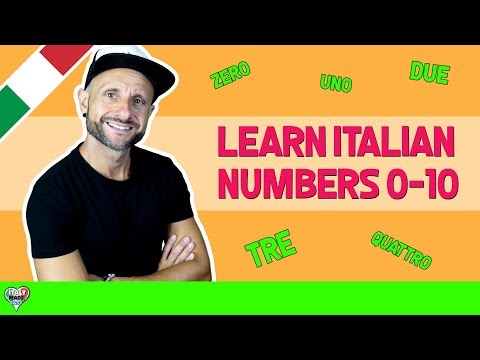Learn the Italian numbers
It’s always tough to use numbers when learning a new language.
They say that you can only truly master a foreign language if you can think in that language and count in that language’s numbers.
But learning numbers is essential because they are used in so many situations, such as telling time, how much something costs, doing math, and even understanding recipes.
This table and examples below will help you learn to read and pronounce the numbers from 1 to 10 like a native speaker.
Italian Numbers 1-10
These are the Italian cardinal numbers from 1 to 10:
| Italian | English | |
| 1 | uno | one |
| 2 | due | two |
| 3 | tre | three |
| 4 | quattro | four |
| 5 | cinque | five |
| 6 | sei | six |
| 7 | sette | seven |
| 8 | otto | eight |
| 9 | nove | nine |
| 10 | dieci | ten |
And what about zero? The word is still ‘zero‘, but the Italian pronunciation is different.
Check out the right pronunciation for all of them in the video at the end of this post.
Let’s take a look at some examples:
Ci sono 5 (cinque) mele nel cesto.
There are 5 apples in the basket.
Sono le 8 (otto), andiamo a cena.
It’s 8 o’clock, let’s go to have dinner.
E’ questa la fermata del bus numero 3 (tre)?
Is this the stop for bus number 3?
Il pane costa 2.10€ (due euro e dieci).
The bread costs 2.10€.
Vorrei 2 (due) caffe’ per favore.
I would like 2 coffees, please.
Italian Ordinal Numbers
So far, we’ve discussed cardinal numbers, which tell us things like “How many apples are in the basket?” “How many times did you use the restroom last night?”
In this section, we’ll talk about Italian ordinal numbers, which tell us about a thing’s specific position within an ordered set.
“First,” “second,” and “third,” for example.
Knowing this comes in handy when trying to understand a hotel receptionist when he tells you what floor your room is on.
Here are the first 10:
| Italian | English translation |
| primo | first |
| secondo | second |
| terzo | third |
| quarto | fourth |
| quinto | fifth |
| sesto | sixth |
| settimo | seventh |
| ottavo | eighth |
| nono | ninth |
| decimo | tenth |
Let’s take a look at these examples:
La sua camera e’ al quarto piano.
Your room is on the fourth floor.
Ho vinto il primo premio alla lotteria.
I won the first prize in the lottery.
Sono gia’ al nono mese di gravidanza.
I’m already in the ninth month of pregnancy.
Because ordinal numbers in Italian act as adjectives, they must be gender and number compatible with the nouns they modify: primo, prima, primi, prime.
Take a look at these phrases:
La prima della fila è quella persona, io sono la terza.
The first in line is that person, I’m the third one.
Sono arrivati per primi.
They arrived first.
Sono le prime fragole della stagione.
They are the first strawberries of the season.

Practice with Quizlet
Here's a set of flashcards and quizzes to practice this grammar topic.Recap
So there you go, now you know how to pronounce the numbers from 1 to 10 in the Italian language and the cardinal numbers.
Are you ready to fly to Italy and order 1, 2, or, 10 coffees?
If you want to learn also large numbers in Italian like 100 (cento), 1000 (mille), or 10000 (dieci mila), check out this lesson.
If you need some more examples on how to use the numbers in real Italian conversations take a look here.




















One Response
Grazie mille for this helpful lesson! I can’t wait to impress my Italian friends with my newfound number skills.